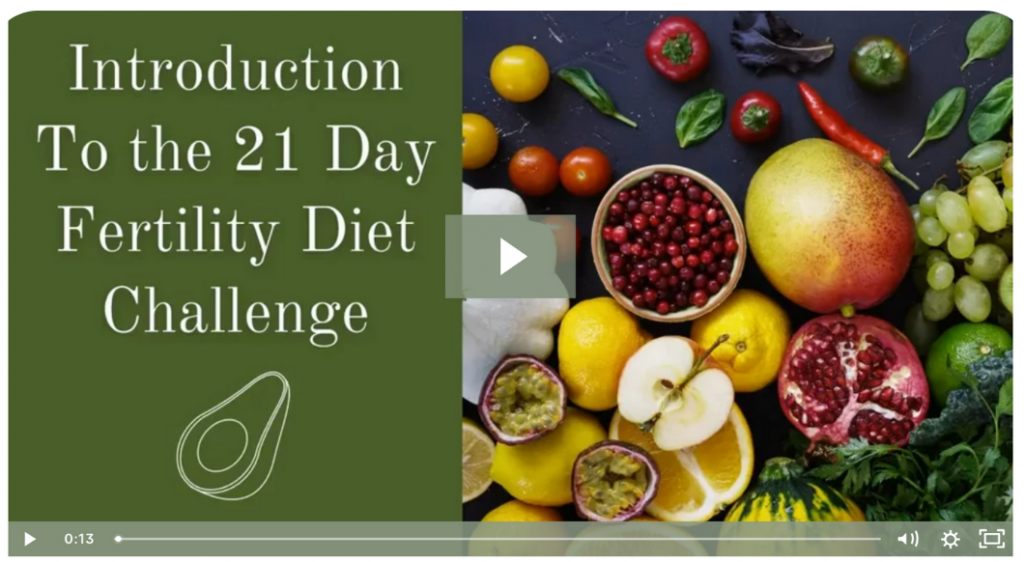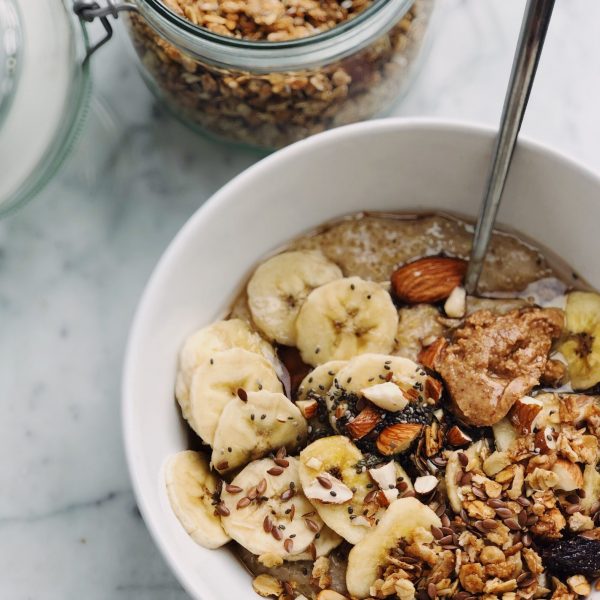One of the most powerful health changes you can make when preparing for pregnancy is to learn how to eat healthier foods shown to be critical for reproductive health. We find that eating a fertility diet can provide the nutrients the body needs to support fertility and carry a baby to term.
We regularly hear a common complaint about eating healthier and we believe that complaint is a myth that holds people back from truly transforming their eating habits for the better.
The Myth: It’s too expensive to eat healthy. The Fact: It does not have to be! There are a variety of ways to save money when transforming your diet.
8 Tips on Ways You Can Eat Healthy for Less Money
1. Buy in Bulk
A 2012 study, conducted by Portland State University and the Bulk is Green Council (BIG), found that the key to saving money on organic food purchases is to buy in bulk.
Purchasing food from bulk bins eliminates the cost of fancy, glamorous packaging, and waste from that packaging. Dried fruits, nuts, seeds, seed and nut butters, honey, grains, beans, granola, and tea are available from bulk bins, or available in larger packages if a bulk bin retailer isn’t available in your area. Purchasing rice and dried beans in one- and two-pound bags is less expensive in the long run than purchasing canned beans and prepared rice side dishes in boxes (there’s also less packaging, less sodium, fewer preservatives, and less processing involved).
Should your local grocery store not have a bulk aisle, there may be a membership-only warehouse food buying club in your area. These often carry a variety of fresh and pre-packaged food items, with many organic options. This option may not be ideal for those of you also looking to cut out excessive packaging, but does allow for you to buy more, for less. This means fewer trips to the grocery store, more food in your fridge and pantry and more money in your pocketbook.
The not-for-profit Center for the Study of Services conducted the Consumers’ Checkbook survey that found that Sam’s Club prices were on average 33% lower, BJ’s prices were on average 29% lower and Costco’s prices on average 30% lower, than the largest supermarket chains.
Another option is to join an organic food-buying club. If you live in a city, you may be able to find a local one. If not, I know you can find some online organic buying clubs where purchases are all done on a website and then they ship directly to you.
Food-buying clubs also create the opportunity for families to coordinate shopping trips, go in on larger purchases (think rice, beans, oats, apples, onions), share membership fees, and shop together.
2. Choose Minimally Processed Foods
Foods that are handled less are often cheaper. Are you thinking, “what?” Bear with me… If the food item you choose has been broken down in a way to create ease of preparation, the cost will be more. The best example is chicken. A whole fryer chicken (skin, bones, and often giblets) for sale costs less than prepackaged boneless, skinless chicken breasts. In my local grocery store a whole cage-free chicken can cost as little as $5.99/lb., but a package of two or three chicken breasts of the same brand costs $6.99/lb. Purchasing an entire chicken may also provide meat for several meals versus just one.
Watch The Introduction to the 21 Day Fertility Diet Challenge
- Learn how to transition to a natural fertility diet by focusing on the important 5
- Get all the details on how to use nutrition as a tool for hormonal health, cell protection and fertility wellness
- An effective tool to help your tastebuds transition towards healthier foods
- Learn which foods are most important for fertility and how to regularly eat them

3. Eat Seasonally and Locally
Farm to Table
Most areas of the world experience at least two different seasons, some of us experience four each year. Different plants flourish and produce more fruits and vegetables in different seasons. Fruits and vegetables are less expensive in the seasons in which they are grown. I often think of blueberries. Where I live, in the Spring blueberries can often be purchased by the carton for anywhere from $0.98 to $1.99 a pound and prices quickly spike to $3.99 to $4.99 a pound in the late Fall and Winter when they aren’t growing here or anywhere near here.
Late in the summer a local CSA, Community Supported Agriculture farm, had an overabundance of peppers and if we are willing to drive to the farm, peppers could be purchased three for $1.00… locally and organically-grown, vibrant, large peppers for cheap.
Do some research on local organic farms in your area and see how you can keep in touch with them, so you know which foods are in season and when. There is great satisfaction in knowing where your food is coming from and it will contain more nutritional value. Why? This is because fresh local produce doesn’t have to be shipped cross-country, which means there is less time for nutrient loss.
5. Compare and Save – Clip Coupons and Sale Shop
Many grocery stores and markets have their own brand of organic and health food. Take time to learn if your favorite food retailer has its own brand, connect with the establishment on social media or sign up for eNewsletters too. This is often how stores promote products and offer coupons.
Another way to save is to stock up when there is a sale, especially on items consumed regularly.
6. Barter
Do you have a talent to share with others or enjoy a particular activity you might offer doing for someone in return for the food they grow? I have a dear friend whose mother is a large-scale gardener. They both, in exchange for my herbal knowledge and the occasional herbal remedy, will share produce or preserved goods.
7. Grow Your Own Food
Please read on because you don’t need acreage or to be a farmer to grow your own food. There are a variety of ways to grow food. I know not everyone has land to till and sow. In fact, not everyone who will read this even has a yard. So, consider the following ways to grow your own food…
- Plant a garden – till and sow seeds in a part of your yard you are sick of mowing or that is unused, or build raised bed gardens in this space. Another option is container gardening on a deck or patio.
- Grow Indoors – window sills are sufficient for growing herbs and microgreens, which are small leaved greens that researchers are learning have nearly four to six times the nutrient levels of the mature leaves from the same plant. Some examples of microgreens are spinach, pea shoots, beets or purple mustard greens, daikon radish, arugula, cilantro, and even basil.
- Rent a community garden plot – plots of land are popping up in even the smallest towns around the US and being designated to gardening. These spaces also encourage community around growing one’s food.
Before you begin, do a little research into what grows well in your area (hardiness zone), soil types best for the veggies, herbs and fruits you are interested in growing and what levels of light are best based on which direction your windows and garden plots face. This will help you to grow your own produce more successfully.
8. Slowly Transition to Organic
If you can’t purchase organic everything, here are a few tips to start making the transition from conventional to organic:
- Fruits and Vegetables – Focus on the dirty dozen. It is believed that produce with skins that can be removed are less likely to pass harmful pesticides and herbicide residue onto those who consume them. According to the Environmental Working Group the top 12 foods most commonly grown with pesticides and tend to have pesticide residue on them, or within them are apples, strawberries, grapes, celery, peaches, spinach, sweet bell peppers, nectarines – imported, cucumbers, cherry tomatoes, imported snap peas and potatoes.
- Meat & Dairy – grass-fed, hormone-free, or organic meat and dairy options are best. Choose lean meat options and high-fat dairy. Eggs should be cage-free.
- Focus on eating foods that pack a healthy punch like avocado, beans, flax seeds, kale, swiss chard, beets, celery and arugula. Each of these provide a variety of fertility health benefits, from healthy fats and nutrients, vitamins and minerals, to enzymes and fiber.
It is important to know that it is perfectly okay to start transitioning your diet by taking baby steps, starting small. It wasn’t an overnight transition for myself and my family and still isn’t complete. I now have jars of grains, beans, nuts, and dried fruits on my pantry shelves and don’t have to purchase these staples nearly as often, allowing me to be able to put my food dollars toward organic food items more often. We recently were able to purchase a quarter of a grass-fed cow to stock our freezer.
Eating healthy is a way of LIFE. Sure, it can take a bit of leg work at first, but the health benefits are worth it.
- Beyman, M. (2012, April 12). Does It Pay To Be A Warehouse Club Member? Retrieved from: http://www.cnbc.com/id/47029484#
- Eliza, B. (2012, August 30). Introducing Microgreens: Younger, And Maybe More Nutritious, Vegetables. Retrieved from: http://www.npr.org/blogs/thesalt/2012/08/29/160274163/introducing-microgreens-younger-and-maybe-more-nutritious-vegetables
- Environmental Working Group. (n.d.). EWG’s 2018 Shopper’s Guide to Pesticides in Produce™. Retrieved from: https://www.ewg.org/foodnews/summary.php
- Meyer, N. (n.d.). University Study Uncovers The Best Way to Save Money on Organic Food (Almost 90% on Average). Retrieved from: http://althealthworks.com/1858/university-study-uncovers-the-best-way-to-save-money-on-organic-food-over-80-on-average/





